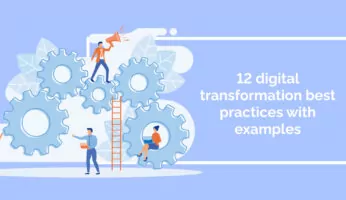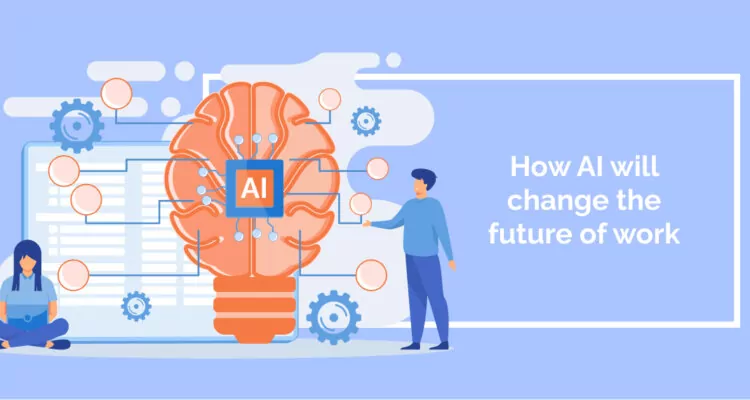
Artificial intelligence (AI) has journeyed from the realms of science fiction to the heart of modern business operations.
In its early days, you might have seen AI as little more than a concept discussed in academic circles.
But today, you witness its applications everywhere— from chatbots that answer customer queries to advanced data analytics transforming decision-making.
Understanding the impact of AI on the future of work has become crucial for forward-thinking leaders like yourself.
Why?
Because the ways in which AI reshapes industries and job roles will directly influence your strategic planning, talent management, and many other facets of your business.
According to OpenText’s 2020 Legal Market Report, 70% of surveyed organizations think using tech to simplify workflows and manual processes is a top priority.
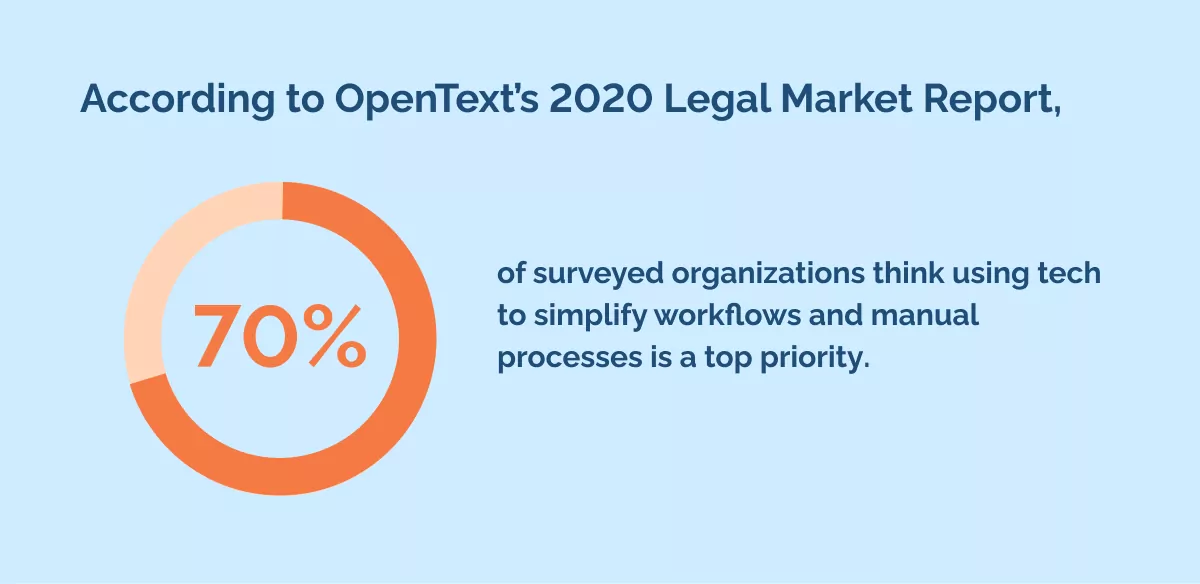
Using AI to increase operational efficiency is the foremost (and most obvious) use case. But you could also use it to enhance decision intelligence and augment creativity and innovation.
And the impact doesn’t stop there.
As we delve deeper into this topic, you’ll gain insights into navigating and capitalizing on the transformative workplace shifts AI brings.
We’ll look at both the good and the bad of how AI will change the future of work so that once you’re done reading, you’ll have developed a full, tempered understanding of these powerful innovations’ impact.
A little bit of context
Before we can predict the future, we first must take a brief look into the past.
Looking back, every major technological revolution has redefined how businesses operate.
The Industrial Revolution, for instance, shifted work from hand production methods to machines, leading to the rise of factories.
Then came the Digital Revolution, which ushered in computers and the internet, altering how you connect, communicate, and conduct business.
Now, enter artificial intelligence.
While past innovations have been transformative, AI stands out because of its ability to learn, adapt, and make decisions. It’s not just another tool; it’s like adding a new kind of intellect to the mix.
For you, this means adapting to new technologies and strategizing around an entity that evolves and can potentially make autonomous decisions.
To truly grasp the significance of AI, imagine having an employee who never sleeps, constantly learns, and can juggle countless tasks simultaneously.
Past technological innovations have augmented human capabilities, but AI promises to be a game-changer, raising the bar for what’s possible in the business world.
The 3 promises of AI in the workplace
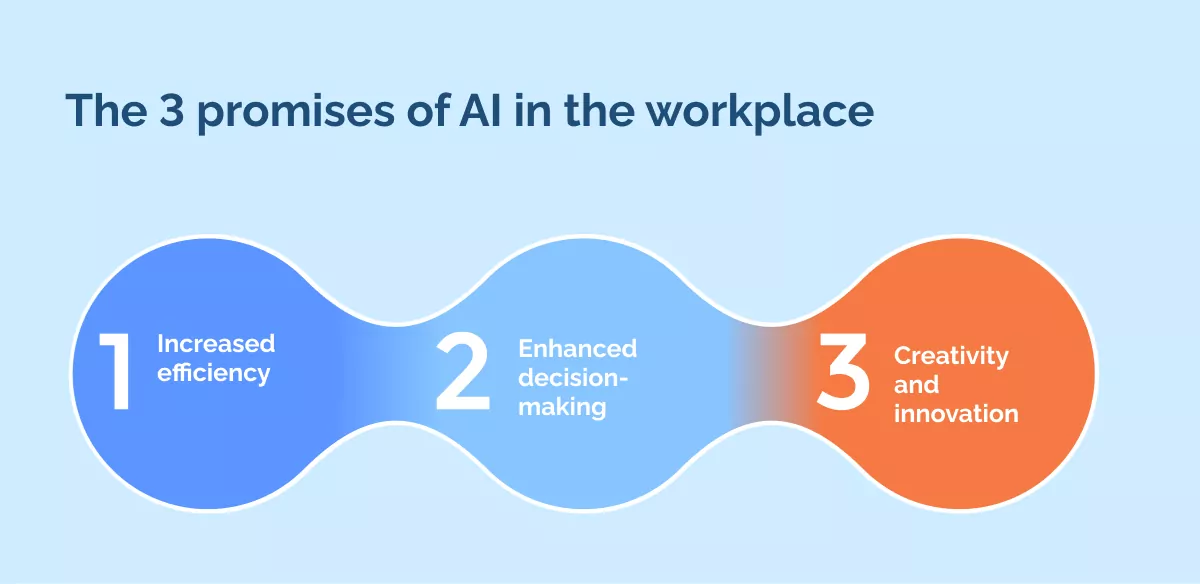
When you’re at the helm of a business, efficiency, decision-making, and innovation are often at the forefront of your concerns.
As you strategize for the future, understanding and leveraging these promises of AI can be the difference between leading the market or playing catch-up.
Here’s how AI can serve as a powerful ally in each of these domains:
Increased efficiency
Think of your teams’ countless hours on manual, repetitive tasks, from data entry to sorting emails.
Now, imagine offloading these to an AI system. AI doesn’t tire or need breaks and handles these tasks with remarkable accuracy.
Automating such chores frees up your workforce to focus on more value-added activities.
The result?
Higher productivity and potentially significant cost savings for your business.
Enhanced decision-making
Data drives modern business. But with the vast amounts of data available, extracting meaningful insights becomes a challenge.
Enter AI.
With its data analysis and predictive modeling capabilities, you can uncover patterns and trends that might be invisible to the human eye.
A 2021 McKinsey survey found that 57% of businesses have adopted AI in some form. And of those adoptees, 47% are using AI for some form of data analytics.
Whether predicting market shifts or understanding customer behaviors, AI provides a clearer, data-backed picture, empowering you to make more informed decisions.
Creativity and innovation
It’s a myth that AI only excels in analytical tasks.
Today’s AI tools can assist in design, music composition, and even content creation.
AI can provide insights or suggestions for designs and concepts by analyzing vast datasets. For you, this means fostering a culture of innovation where AI aids your teams in brainstorming sessions, research, and development.
Instead of replacing the creative process, AI enhances it, providing fresh perspectives based on data-driven insights.
3 ways AI will change the future of work
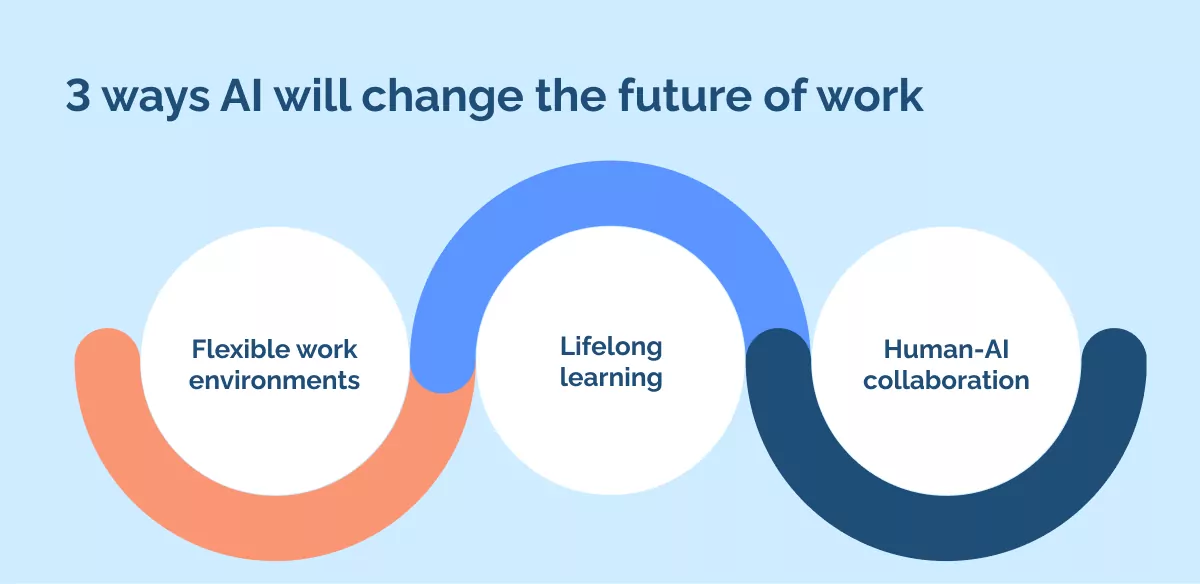
In a world where AI is rapidly integrating into businesses, the essence of what work means is transforming.
As a forward-thinking leader, you need to understand and anticipate these shifts to lead your organization effectively.
Here are our predictions for the 3 main ways AI will change the future of work:
1. Flexible work environments
Gone are the days when work was synonymous with a physical office space.
With AI-driven tools facilitating seamless communication and collaboration, remote work is becoming the norm rather than the exception.
Decentralized operations mean that your teams can be spread across the globe yet function as cohesively as if they were in the same room. AI-powered collaboration tools can predict project needs, allocate resources intelligently, and even facilitate brainstorming sessions.
Embracing this flexibility improves the employee experience and widens the talent pool you can tap into.
2. Lifelong learning
The dynamism introduced by AI requires a shift from traditional career paths to a more fluid approach. No longer can one rely solely on formal education to last a lifetime.
Continuous education, upskilling, and adaptability become the cornerstones of professional growth.
It will become crucial for you as a leader to foster a culture that values and facilitates lifelong learning.
This could mean providing access to online courses, hosting workshops, or simply encouraging a mindset that values curiosity and growth.
3. Human-AI collaboration
There’s a prevalent fear that AI will replace human jobs. But a more nuanced perspective sees AI as a collaborator rather than a competitor.
Instead of pitting human intelligence against artificial intelligence, imagine the possibilities when they work in tandem.
AI can handle data analysis at lightning speeds, but humans bring creativity, emotional intelligence, and context awareness to the table. Training your teams to leverage AI tools can lead to outcomes neither could achieve independently.
Which roles and industries will be most affected by AI?
AI’s influence is pervasive, touching various sectors.
Knowing which areas stand to be most impacted can guide your strategic focus and investment decisions.
AI isn’t just about automation and efficiency. It’s about reshaping industries, redefining roles, and uncovering fresh opportunities.
By staying abreast of these transformations, you can position your business for success in an AI-driven world.
Sectors with high automation potential
Manufacturing has always been at the forefront of automation, and with AI, this trend is accelerating.
Robotic Process Automation (RPA), guided by AI algorithms, can ensure precision, optimize production lines, and even conduct maintenance checks.
In logistics, AI streamlines operations from inventory management to optimized routing for deliveries, promising faster, more reliable services.
Agriculture, too, is undergoing a quiet revolution. AI-powered drones monitor crop health, and automated tractors make precision farming a reality, ensuring better yields and resource use.
White-collar transformations
While an automation strategy in industries like manufacturing might seem intuitive, it’s vital to recognize the changes AI brings to traditional white-collar sectors.
In finance, algorithms now guide investment strategies, assess credit risks, and detect fraudulent activities.
Healthcare sees AI assisting in diagnostic procedures, predicting patient needs, and even aiding in surgical operations.
Customer service, a domain once purely driven by human interaction, now leans heavily on AI chatbots and predictive analytics to personalize customer experiences and resolve issues swiftly.
New roles and opportunities created by AI’s presence
With the rise of AI, new job roles are emerging.
Positions like prompt engineers, who craft effective and precise instructions for AI models, or ethicists, who ensure AI applications align with societal values, are in demand.
For your business, this means an opportunity to pioneer new niches and to train or hire talent with expertise in these burgeoning areas.
3 major challenges posed by AI in the work sphere
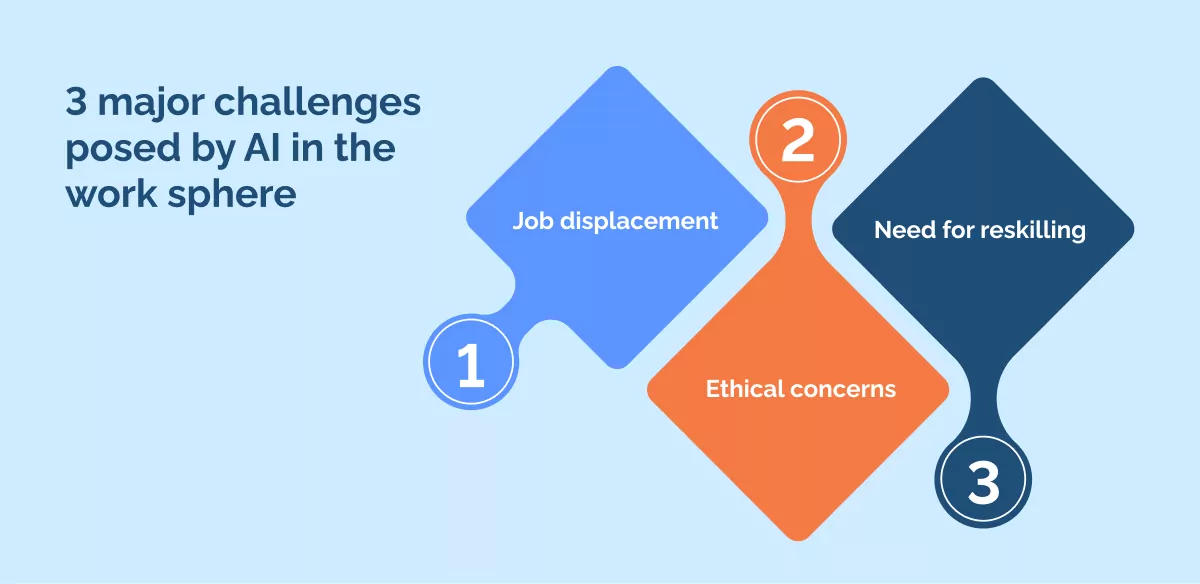
While the advantages of AI integration are compelling, you must also confront the challenges it presents.
Facing these challenges head-on allows you to harness AI’s potential responsibly.
Addressing these proactively can also ensure a smoother transition and greater sustainability in the long run.
1. Job displacement
It’s undeniable: the automation potential of AI means certain job roles are at risk of becoming redundant.
While AI introduces efficiency, it also raises the concern of workforce displacement. Jobs with repetitive tasks are particularly vulnerable.
As you strategize for the future, weighing the benefits of AI-driven efficiency against the societal and organizational impacts of potential job losses is crucial.
2. Ethical concerns
Integrating AI isn’t just a technological endeavor; it’s an ethical one, too.
Privacy issues arise when AI systems handle vast amounts of personal data, raising concerns about how and where this data is stored and utilized.
Then there’s the issue of bias.
AI systems learn from data; if this data contains biases (often unintentional), the AI can perpetuate or even amplify them. For businesses, this can lead to unfair or discriminatory practices, especially in areas like hiring or lending.
Furthermore, the misuse of AI technology, whether for surveillance or misinformation, can harm your brand’s reputation and trustworthiness.
3. Need for reskilling
The AI landscape is dynamic, and the skill sets required to navigate it evolve rapidly.
This means a continuous investment in employee training and development for your organization.
As certain roles diminish, new ones emerge. Ensuring your workforce can transition, adapt, and excel in this changing environment is paramount.
This could mean offering training programs, collaborating with educational institutions, or even adopting a culture of lifelong learning within your organization.
Preparing for an AI-driven future
The transformative power of AI presents both unparalleled opportunities and significant challenges.
Most businesses still haven’t realized the true power of AI-driven data.
A 2021 report from McKinsey found that while 75% of companies in the metals and mining industry have implemented some form of AI, less than 15% have realized a meaningful impact.
In the near future, you could be directly responsible for boosting that statistic. Here are a couple of tips to get you started.
First, understand how to integrate AI into your operations without compromising on core values.
This means ensuring that AI applications align with ethical guidelines, are transparent in their operations, and are used responsibly.
Second, prioritize employee well-being.
While AI can enhance efficiency, ensuring that your workforce feels valued, understands the changes, and is equipped to work alongside AI is crucial. This might involve training sessions, open dialogues about technological changes, and initiatives to promote mental health.
The AI-driven future is not a distant reality— it’s unfolding right now.
By actively engaging with these preparatory measures, you can ensure that your organization doesn’t just adapt but truly thrives in this new era.
WalkMe Team
WalkMe spearheaded the Digital Adoption Platform (DAP) for associations to use the maximum capacity of their advanced resources. Utilizing man-made consciousness, AI, and context-oriented direction, WalkMe adds a powerful UI layer to raise the computerized proficiency, everything being equal.


